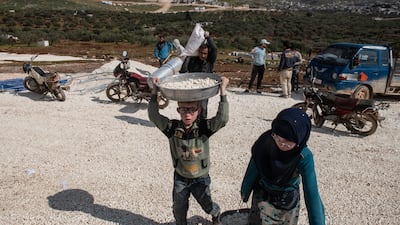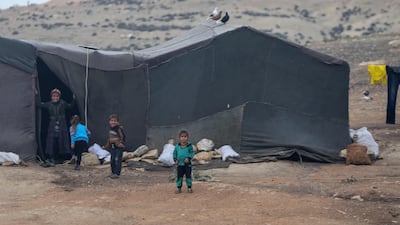A humanitarian crisis in Syria is deepening amid ongoing sanctions and economic mismanagement by the government of President Bashar Al Assad, aid agencies have said.
Their warning on the worsening crisis — mainly focused on a country-wide cholera epidemic — came as two million vaccine doses arrived in the country, the first since the epidemic began in late August.
Syria's Health Ministry has documented 1,556 cases and 49 deaths since then.
Both the ministry and the United Nations believe the source of the outbreak is linked to people drinking from the Euphrates River and irrigating crops with the contaminated water.
Heavily damaged infrastructure after more than a decade of war has also been blamed.
The ministry said the vaccines were from UN children’s agency Unicef and international organisation Gavi.
It announced a two-week vaccine drive starting in December in the Aleppo countryside, Deir Ezzor, Hasakah and Raqqa, the areas most affected by the illness.
Basic infrastructure — including water supply and sanitation ― has broken down across much of the country, particularly in the war ravaged north-eastern governorate of Idlib, where Al Qaeda-linked extremists control part of the territory.
The vaccine drive comes amid severe fuel shortages and huge surges in the price of basic food staples, sending millions into deep poverty.
The crisis has been exacerbated by the Russian invasion of Ukraine, which has led to a global food and fuel price crisis.
On Tuesday, agencies including Save the Children International, Oxfam and the Norwegian Refugee Council warned that a cholera outbreak risked spiralling out of control, particularly in the north-east where 87,000 people live in camps, refugees from the country’s civil war that began in 2011.
As of November 14, there had been 35,000 suspected cases of cholera, the agencies said.
Many others are vulnerable in communities across the country, where reconstruction has been slow amid economic collapse.
In regions where fighting ended years ago, infrastructure still lies in ruins, devastated by Russian and Syrian air raids, and in the east of the country, bombed during the US-led war against ISIS.
Fuel crisis
Agencies said rising fuel prices will make it a difficult winter for over 2.5 million conflict affected people in the country, adding more financial pressure on families to choose between food or heating.
Syria barely has the refinery capacity to meet domestic fuel demand and the investment-starved sector has also been affected by sanctions, leading to a tightening of government fuel rations.
To address shortages, Prime Minister Hussein Arnous has ordered a 40 per cent reduction in the fuel ration provided to government staff and restrictions on official travel for non-urgent purposes.
Public transport is exempt, said the government, which blamed shortages on delays in shipments and US sanctions.
But highly subsidised fuel has also led to shortages caused by smuggling.
Subsidised fuel is already hard to come by in Syria, with motorists often waiting weeks for notifications to receive less than a full tank of petrol.




